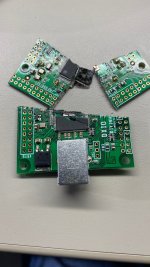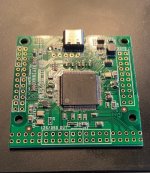I purchased a XMOS Multichannel high-quality USB to/from I2S/DSD SPDIF board from DIYINHK and when plugging in to USB port PC responds with "USB POWER SURGE"
DIYINHK is not responsive I really need this unit to work.
Has anyone found a better way to contact DIYINHK?
😡😡
DIYINHK is not responsive I really need this unit to work.
Has anyone found a better way to contact DIYINHK?
😡😡
I was just about to post about another problem im having with the DIYINHK Multichannel interface.
Mine will not play with 24 bit output set in the DIYINHK Control panel, only 16 bit output works.
All output types (WASAPI, DS, KS) and players are affected.
foobar gives an ASIO error 'unable to create buffers'...
I tried 2 different versions of the full driver.
Re your problem: DIYINHK interface does not use USB vbus , check for continuity between vbus and ground with the cable attached (but not plugged into PC)... might be a simple short somewhere.
Could also be a faulty interface doing something to the USB datalines... these are very fragile devices.
I have broken 2 of the standard stereo interfaces in the past with seemingly no cause.
One broke after simply connecting the spdif output to a DAC (others have also reported this happening with to their xmos interfaces)...
When doing anything with them now I make sure to disconnect USB and any other devices, make sure supply is fully off (fully discharged or disconnected completely) and take precautions for static... not taking a single chance.
Mine will not play with 24 bit output set in the DIYINHK Control panel, only 16 bit output works.
All output types (WASAPI, DS, KS) and players are affected.
foobar gives an ASIO error 'unable to create buffers'...
I tried 2 different versions of the full driver.
Re your problem: DIYINHK interface does not use USB vbus , check for continuity between vbus and ground with the cable attached (but not plugged into PC)... might be a simple short somewhere.
Could also be a faulty interface doing something to the USB datalines... these are very fragile devices.
I have broken 2 of the standard stereo interfaces in the past with seemingly no cause.
One broke after simply connecting the spdif output to a DAC (others have also reported this happening with to their xmos interfaces)...
When doing anything with them now I make sure to disconnect USB and any other devices, make sure supply is fully off (fully discharged or disconnected completely) and take precautions for static... not taking a single chance.
Thanks I noticed the USB interface does not have ESD diode - not a good design practice.
I have an ESD mat and bracelet, I think the board was damaged before I received it or in transit.
I have an ESD mat and bracelet, I think the board was damaged before I received it or in transit.
DIYINHK issues a refund.
OK so I will try again.
I will suggest that they could have ignored a small customer 1/2 a world away but chose not to.
I will post my next attempt when the new board arrives. - BUT I will add ESD diodes to the USB port.
OK so I will try again.
I will suggest that they could have ignored a small customer 1/2 a world away but chose not to.
I will post my next attempt when the new board arrives. - BUT I will add ESD diodes to the USB port.
Last edited:
Did a quick a search and DIYINHK seem to have several boards. Make sure there is not too much capacitance on the USB power line - think the limit is 10uF. If you fit anything bigger that will cause the surge protection problem - as I found when i "upgraded" an external USB DAC.
ESD diodes should not make a difference on surge current (unless their voltage rating is less than 5V so they are conducting in normal operationg...)
ESD diodes should not make a difference on surge current (unless their voltage rating is less than 5V so they are conducting in normal operationg...)
My problem seems to be a mysterious issue with this particular PC ... it works on another PC just fine, both running win10.
IME, most USB boards sound better if USB power is avoided. Better if the presence of USB power just enables a separate dedicated clean power supply that is actually used to power the board.
DIYINHK DXIO trouble shooting
The DXIO board failed due to EOS (an ESD event).
The specific item that failed is the 3.3V regulator.
As part of requirements for refund DIYINHK required that I destroy the board. (see photo).
So no more trouble shooting will be possible. I will however install the GMF05C-HSF ESD diode array on USB DP, DN, +5V (attached) and anywhere else I may use XMOS device I/O.
The diodes are rated for 12Amps peak for an ESD event.
https://files.diyaudio.com/forums/images/attach/pdf.gif
https://www.diyaudio.com/forums/attachment.php?attachmentid=878975&stc=1&d=1601161785
The DXIO board failed due to EOS (an ESD event).
The specific item that failed is the 3.3V regulator.
As part of requirements for refund DIYINHK required that I destroy the board. (see photo).
So no more trouble shooting will be possible. I will however install the GMF05C-HSF ESD diode array on USB DP, DN, +5V (attached) and anywhere else I may use XMOS device I/O.
The diodes are rated for 12Amps peak for an ESD event.
https://files.diyaudio.com/forums/images/attach/pdf.gif
https://www.diyaudio.com/forums/attachment.php?attachmentid=878975&stc=1&d=1601161785
Attachments
Last edited:
It seems DIYINHK is concerned about my posts. They will not process my order.
They refunded my payment for the replacement unit.
I think there is a language barrier making it difficult to communicate.
I will keep trying.
They refunded my payment for the replacement unit.
I think there is a language barrier making it difficult to communicate.
I will keep trying.
Product based on USB type B no longer available.
Product based on USB type C is available.
Will advise on arrival.
Product based on USB type C is available.
Will advise on arrival.
It often takes a couple or three days to get shipping tracking from DIYinHK but from experience they are solid and shipping is quick.
I have bought several items over the last few years with no problems and consider them one of the more reliable vendors from that part of the world 🙂
I have a couple of their USB to i2c boards and never hot-plug them.
So far no problems at all. Ymmv.
I have bought several items over the last few years with no problems and consider them one of the more reliable vendors from that part of the world 🙂
I have a couple of their USB to i2c boards and never hot-plug them.
So far no problems at all. Ymmv.
Ive been having this problem with my DIYinHK interface, sometimes when some other mains powered stuff is switched off/on the interface will suddenly stop working, it is still connected and visible in windows and can play in softare but the DAC doesnt receive any data. replugging USB doesnt fix it... it has be fully power cycled.
Could this be related to the missing protection diodes?
Could this be related to the missing protection diodes?
Please refer to the official xmos datasheet page 26
https://www.xmos.ai/download/XUF216-512-TQ128-Datasheet(1.17).pdf
2KV ESD HBM protection is already built in the xmos chip.
If the user requires higher ESD protection, they can solder an ESD protection diode directly behind the USB socket easily. We are not selling a complete product, user can always enhance the pcb beyond our imagination.
The default 2kV ESD protection is more than enough for most usage, if the xmos pcb is used in portable device, higher ESD protection may be needed.
The USB 5V from the computer is NOT connected on the multichannel xmos PCB and the pcb cannot/do not use any power from the computer, there is no way it can causes power surge to the computer. Power surge is always caused by bad cable or error modification from the user.
###
There are always user asking about the ESD protection since last year, it looks like it is caused by this thread and I hope it is solved. It is impossible to check every forum on the internet everyday, please use our store message system for any order question. Different situation of different buyer always have different arrangment.
For this buyer, if I don't remember wrongly, due to that pcb version he bought is out of stock at that time, his order is refunded and I also sent another version of PCB to him free to test.
https://www.xmos.ai/download/XUF216-512-TQ128-Datasheet(1.17).pdf
2KV ESD HBM protection is already built in the xmos chip.
If the user requires higher ESD protection, they can solder an ESD protection diode directly behind the USB socket easily. We are not selling a complete product, user can always enhance the pcb beyond our imagination.
The default 2kV ESD protection is more than enough for most usage, if the xmos pcb is used in portable device, higher ESD protection may be needed.
The USB 5V from the computer is NOT connected on the multichannel xmos PCB and the pcb cannot/do not use any power from the computer, there is no way it can causes power surge to the computer. Power surge is always caused by bad cable or error modification from the user.
###
There are always user asking about the ESD protection since last year, it looks like it is caused by this thread and I hope it is solved. It is impossible to check every forum on the internet everyday, please use our store message system for any order question. Different situation of different buyer always have different arrangment.
For this buyer, if I don't remember wrongly, due to that pcb version he bought is out of stock at that time, his order is refunded and I also sent another version of PCB to him free to test.
Last edited:
Ive been having this problem with my DIYinHK interface, sometimes when some other mains powered stuff is switched off/on the interface will suddenly stop working, it is still connected and visible in windows and can play in softare but the DAC doesnt receive any data. replugging USB doesnt fix it... it has be fully power cycled.
Could this be related to the missing protection diodes?
We have experence if the soldering iron switch off/on behind the xmos dac combo without enclosure during testing, the i2s stop. I think it is a good demonstration of EMI and EMP.
Wiki also have the related information
Electromagnetic pulse - Wikipedia
The XMOS Design Note that gave concern was the one at: https://www.xmos.ai/download/Design...onnections-for-xCORE-200-USB-devices(2.0).pdf
Perhaps it does not apply to XUF216 version devices.
Perhaps it does not apply to XUF216 version devices.
- Home
- Source & Line
- Digital Line Level
- Problems with DIYINHK XMOS board


